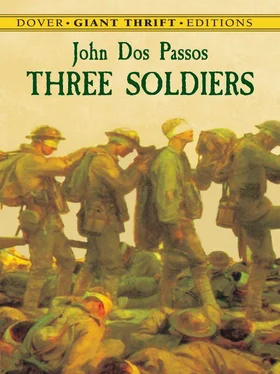Andrews felt a sense of shame, he did not exactly know why.
“My brother writes that in South America the women are very brown and very passionate,” added Marcel with a wistful smile. “But travelling and reading books, that’s what I like… But look, if you want to take the train back to Paris… ” Marcel pulled up the horse to a standstill. “If you want to take the train, cross that field by the foot path and keep right along the road to the left till you come to the river. There’s a ferryman. The town’s Herblay, and there’s a station… And any Sunday before noon I’ll be at 3 rue des Evèques, Reuil. You must come and we’ll take a walk together.”
They shook hands, and Andrews strode off across the wet fields. Something strangely sweet and wistful that he could not analyse lingered in his mind from Marcel’s talk. Somewhere, beyond everything, he was conscious of the great free rhythm of the sea.
Then he thought of the Major’s office that morning, and of his own skinny figure in the mirrors, repeated endlessly, standing helpless and humble before the shining mahogany desk. Even out here in these fields where the wet earth seemed to heave with the sprouting of new growth, he was not free. In those office buildings, with white marble halls full of the clank of officers’ heels, in index cards and piles of typewritten papers, his real self, which they had power to kill if they wanted to, was in his name and his number, on lists with millions of other names and other numbers. This sentient body of his, full of possibilities and hopes and desires, was only a pale ghost that depended on the other self, that suffered for it and cringed for it. He could not drive out of his head the picture of himself, skinny, in an ill-fitting uniform, repeated endlessly in the two mirrors of the major’s white-painted office.
All of a sudden, through bare poplar trees, he saw the Seine.
He hurried along the road, splashing now and then in a shining puddle, until he came to a landing place. The river was very wide, silvery, streaked with pale-green and violet, and straw-color from the evening sky. Opposite were bare poplars and behind them clusters of buff-colored houses climbing up a green hill to a church, all repeated upside down in the color-streaked river. The river was very full, and welled up above its banks, the way the water stands up above the rim of a glass filled too full. From the water came an indefinable rustling, flowing sound that rose and fell with quiet rhythm in Andrews’s ears. Andrews forgot everything in the great wave of music that rose impetuously through him, poured with the hot blood through his veins, with the streaked colors of the river and the sky through his eyes, with the rhythm of the flowing river through his ears.
“SO I came without,” said Andrews, laughing.
“What fun!” cried Geneviève. “But anyway they couldn’t do anything to you. Chartres is so near. It’s at the gates of Paris.”
They were alone in the compartment. The train had pulled out of the station and was going through suburbs where the trees were in leaf in the gardens, and fruit trees foamed above the red brick walls, among the box-like villas.
“Anyway,” said Andrews, “it was an opportunity not to be missed.”
“That must be one of the most amusing things about being a soldier, avoiding regulations. I wonder whether Damocles didn’t really enjoy his sword, don’t you think so?”
They laughed.
“But mother was very doubtful about my coming with you this way. She’s such a dear, she wants to be very modern and liberal, but she always gets frightened at the last minute. And my aunt will think the world’s end has come when we appear.”
They went through some tunnels, and when the train stopped at Sèvres, had a glimpse of the Seine valley, where the blue mist made a patina over the soft pea-green of new leaves. Then the train came out on wide plains, full of the glaucous shimmer of young oats and the golden-green of fresh-sprinkled wheat fields, where the mist on the horizon was purplish. The train’s shadow, blue, sped along beside them over the grass and fences.
“How beautiful it is to go out of the city this way in the early morning!… Has your aunt a piano?”
“Yes, a very old and tinkly one.”
“It would be amusing to play you all I have done at the ‘Queen of Sheba.’ You say the most helpful things.”
“It is that I am interested. I think you will do something some day.”
Andrews shrugged his shoulders.
They sat silent, their ears filled up by the jerking rhythm of wheels over rails, now and then looking at each other, almost furtively. Outside, fields and hedges and patches of blossom, and poplar trees faintly powdered with green, unrolled, like a scroll before them, behind the flicker of telegraph poles and the festooned wires on which the sun gave glints of red copper. Andrews discovered all at once that the coppery glint on the telegraph wires was the same as the glint in Geneviève’s hair. “Berenike, Artemisia, Arsinoë,” the names lingered in his mind. So that as he looked out of the window at the long curves of the telegraph wires that seemed to rise and fall as they glided past, he could imagine her face, with its large, pale brown eyes and its small mouth and broad smooth forehead, suddenly stilled into the encaustic painting on the mummy case of some Alexandrian girl.
“Tell me,” she said, “when did you begin to write music?”
Andrews brushed the light, disordered hair off his forehead.
“Why, I think I forgot to brush my hair this morning,” he said. “You see, I was so excited by the idea of coming to Chartres with you.”
They laughed.
“But my mother taught me to play the piano when I was very small,” he went on seriously. “She and I lived alone in an old house belonging to her family in Virginia. How different all that was from anything you have ever lived. It would not be possible in Europe to be as isolated as we were in Virginia… Mother was very unhappy. She had led a dreadfully thwarted life… that unrelieved hopeless misery that only a woman can suffer. She used to tell me stories, and I used to make up little tunes about them, and about anything. The great success,” he laughed, “was, I remember, to a dandelion… I can remember so well the way Mother pursed up her lips as she leaned over the writing desk… She was very tall, and as it was dark in our old sitting room, had to lean far over to see… She used to spend hours making beautiful copies of tunes I made up. My mother is the only person who has ever really had any importance importance in my life… But I lack technical training terribly.”
“Do you think it is so important?” said Geneviève, leaning towards him to make herself heard above the clatter of the train.
“Perhaps it isn’t. I don’t know.”
“I think it always comes sooner or later, if you feel intensely enough.”
“But it is so frightful to feel all you want to express getting away beyond you. An idea comes into your head, and you feel it grow stronger and stronger and you can’t grasp it; you have no means to express it. It’s like standing on a street corner and seeing a gorgeous procession go by without being able to join it, or like opening a bottle of beer and having it foam all over you without having a glass to pour it into.”
Geneviève burst out laughing.
“But you can drink from the bottle, can’t you?” she said, her eyes sparkling.
“I’m trying to,” said Andrews.
“Here we are. There’s the cathedral. No, it’s hidden,” cried Geneviève.
They got to their feet. As they left the station, Andrews said:
“But after all, it’s only freedom that matters. When I’m out of the army!.. ”
Читать дальше












